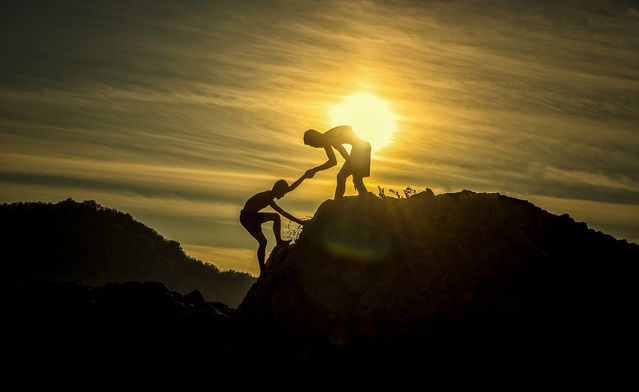Forgiveness
Be Known for What You Do, Not What You Say
Real respect comes from what we do in the face of a moment that truly matters.
Posted March 1, 2019

...Beyond this place of wrath and tears Looms but the Horror of the shade,
And yet the menace of the years Finds, and shall find, me unafraid.
It matters not how strait the gate,
How charged with punishments the scroll. I am the master of my fate:
I am the captain of my soul…
—William Ernest Henley
The words in this poem not only gave comfort to one of modern history’s most beloved leaders in his darkest hours, but they also helped to reinforce his resolve in all his future dealings as he finally stepped into the sunlight a free man after 27 years of incarceration.
In other ways, this man was less than an angel; like any other, he had his frailties. But the difficult choices he’d had to make did not make him a lesser man. Instead, they molded him for the good.
He did not desire to be a hero for a cause, but a leader to a broken nation. His actions on the world stage redefined the meaning of forgiveness and tolerance. That country was South Africa. The man? Nelson Mandela, known by those who loved and respected him as Madiba, or “father.”
South Africans, regardless of their age, called him so. Striving to create what many thought was impossible, he endeavored to bring a torn people together. This was only possible through forgiveness. Forgiveness even for those who committed unspeakable acts of violence and malice was a hard road for many, but it became Mandela’s unmovable touchstone.
To my mind, one discovers the measure of a person by what they do in the face of a moment that truly matters. The friend in the schoolyard that breaks away from the baying pack to come and stand by your side. The unexpected hand that quietens one at the moment of acute vulnerability. The person who picks you up when others watch you falling.
This is no abstract theory. I have been that person shivering in the cold wind. I know what it feels like to receive warmth and kindness from another. Whatever strength I have today is because of the manna that is brought to me by those who care.
We humans are the most paradoxical species on the planet. We are capable of creating such beauty, and also undeniable cruelty. Some of us are externally blessed by looks, good fortune and halos of admiration, and this bounty of privileges amounts to not much more than an empty vessel.
Then there are many whose light is not nearly as bright, who resemble dark tempests with well-worn faces, yet we find within them great heart; they shine with their own unique, authentic light. It perpetually amazes me that so many with so little always seem to give the most—the most of themselves.

Personal authority does not come from promises or grandstanding, but from truthful action—deeds with purpose. So much in life has been orphaned because we humans have failed repeatedly to do the right thing; we're short on effort, but long on opinion.
We excuse our unsavory actions at work as separate from our true selves: just business and a part of the theatre of life. We excuse less-than-exemplary acts in private life as being "just the way I was brought up" or "it serves them right.”
In every moment (not just the ones we choose to consider), the way we conduct ourselves, how we treat people, how we enjoy the fruits of our endeavors, is what defines our very substance. Care and responsibility form the double helix in the DNA of all humans, and this permeates all walks of life and all corridors of business.
The fact of the matter is that we are limited or freed by the combination of our knowledge and the environment in which we are brought up and live in. It follows then, that it is important not to assume that one’s personal perspective supersedes the values of others, only that it is different. Our cultures and national histories will never align us to a point of absolute unanimity, but diversity is a treasure, not a sore—if we allow it to be so.
The more one experiences life, the more chameleon-like characters we encounter. Some of us are masters of emotional camouflage and deception—and yet the double helix rule is ever-present: apply care and act with responsibility. Changing one’s outer coat to protect against the conditions of life will never justify the jettisoning of one’s personal integrity.
None of us are pure, even though we might strive to be so. But we cannot go wild for most of the day and then seek forgiveness in the hour of the closing. We cannot be cruel, then assume absolution in our temples of worship later. That’s just hypocrisy.
In order to remain true, we need to be ever mindful of change, able to adopt truths and course correct at the crucial moments.
I am reminded of this much-loved French proverb: A cœur valiant, reins d’impossible (nothing is impossible for a willing heart). To be valiant is to be more than brave in the face of challenge—it means to be honorable in the way one conducts oneself when confronted with challenge and difficulty.
To be valiant in business and life is to be a step beyond courageous, it is protecting one’s personal authority, doing what is right, or as my beloved father used to say, "Go to sleep knowing you made someone happy today."
We desire to be respected and hope we are in various ways needed, but the question is, are we willing to be known for what we do? Not the work, not the position, not the status, but the true meaning of us to those we touch through our own lives. This is the meaning of authority.
Life is not about all the epic moments of great importance, but all the seemingly less important things that together make the day beautiful or another cruel entry in the diary—the bouncing atoms of our every day. It is this that makes the whole of us.
What absolutely defines a person is what they do at any given moment of truth—it defines the very fabric of who they really are.
Follow your own personal authority both carefully and responsibly, and you’ll find you can motivate and inspire others. I wish you a fair journey so that you may help others to fare well.




